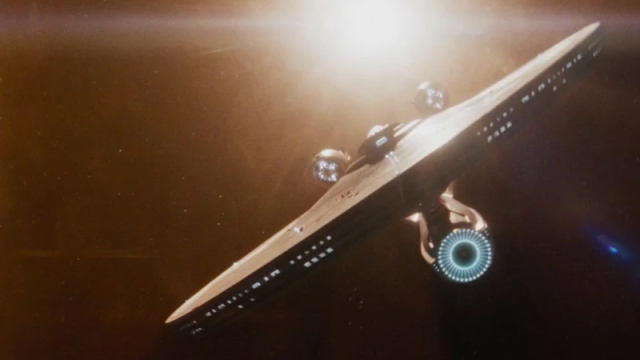Allow us to introduce you to the latest inconsequential benefit of our megacorp dystopia. I have to admit it, as far as incredibly minor bright sides to the horrifying rise of media studio megamergers go, “At least CBS owns the Kelvin Timeline Star Trek movies” is not as immediately exciting as “At least the X-Men can appear in the MCU.”
After years of speculation and attempts, Deadline reports that U.S. based media organisations CBS and Viacom have officially confirmed that the companies will merge assets to form ViacomCBS. It means that CBS’s TV networks, local news stations, Showtime, and assets like publishing firm Simon & Schuster all now share a roof with MTV, Nickelodeon, and the Paramount Pictures movie studio.
It’s not actually the first time CBS and Viacom have been part of the same company — the two split in 2006 in an attempt to free Viacom from the at-the-time misfortunes of a flailing CBS, only for the network to become one of the dominant forces of the TV industry in the intervening years. Remerging the companies makes it not just more viable to shore up Viacom’s downturn, but makes the newly-recombined corporation potentially more attractive to add more into its fold, as owner Shari Redstone seeks to compete with even larger megacorps like Disney/Fox, AT&T/Time Warner, and tech giants like Apple and Amazon.
In terms of particularly genre-centric news, the deal is not as immediately grabby as it was when Marvel Studios suddenly had access to the likes of the X-Men and Fantastic Four again after decades of their rights being at another studio. But it does mean that the Paramount-produced Star Trek films — including the original films and the the reboot trilogy of Star Trek 2009, Into Darkness, and Beyond — are now officially part of the same family as the CBS-owned Trek TV entries in the franchise. It means that for the first time since Star Trek: Enterprise ended, the rights to the entirety of Star Trek are all in the same place.
Given that plans for a fourth Star Trek film in that timeline are still in a nebulous, uncertain state, what that means going forward — beyond ease of distribution and an easier enmeshing of the reboot Trek with its predecessors in ancillary material — remains to be seen.
Although not on the same scale as Disney’s absorption of 21st Century Fox earlier this year — the ramifications of which are still being felt as Disney continues to cut a swath through both the Fox film schedule and jobs at its studios as it tries to ensure a new, Mickey-Mouse-approved future for the company and its production slate — this is but the latest shrinking of competition in the media landscape.
As companies amass capital to combine into ever-increasingly-unwieldy forms in an attempt to compete with the likes of Netflix, Apple and the House of Mouse as they all tighten their grips on the sort of films and TV shows being made, competing with each other and even themselves in increasingly ludicrous tête-à-têtes, antitrust issues only continue to grow.
And that’s before we even get into these selfsame media-Voltrons warring over the increasingly fragmented world of streaming, as gobs of cash are flung at every big-name creative under the sun to sign up exclusively with yet another subscription to vie for your wages every month. It’s all the fun of your favourite cyberpunk corporate futures, but with absolutely zero techno-drugs, cybernetic augments, or even cool jackets with light-up neon trims and what have you.
So not fun at all really.
We’ll bring you more on what the CBS-Viacom merger means for its myriad properties as and when we learn it.
